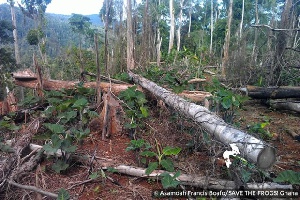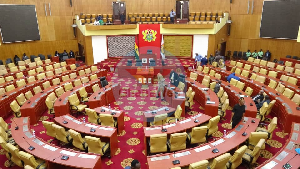Ghana is geographically located in the tropics, endowed with diverse natural resources. And one of these resources that have been most abused is its forests resources and by extension its wildlife. Forests cover about one-third of Ghana’s total area.
The interdependency of forest and wildlife and the need to take appropriate measures to optimize resource utilization , to ensure future supplies of wood and non-wood products and to manage national forest and wildlife in order to maintain the ecological balance and the diversity of the natural environment is very critical to our survival (Forest and Wildlife Policy, September, 1995)
The forest is the home of wildlife, hence the absence of forest impact negatively on the existence of wildlife. Wildlife survives mostly in the forest. We cannot talk about the basics of life –food, water and shelter without our forest resources. The forest and wildlife are therefore in a symbiotic relationship.
The present state of Ghana’s forest is a wakeup call for every well-meaning human being who values life as wealth. As of 2013, Ghana's forests cover was 1.6million hectares from 8million hectares at the beginning of the 1990s. This is as a result of high incidence of illegal chainsaw logging, legal harvest and illegal mining popularly known as “Galamsey” in Ghana.
Ghana’s REDD (Reducing Emissions from Deforestation and Forest Degradation) readiness proposal claims that drivers of deforestation can be mainly attributed to agricultural expansion (which contributes to 50%), harvesting of wood (35%), population and development pressures (10%) and mining (5%) (Forestry Commission, 2012).
There is a popular saying that “When the last tree dies, the last man dies”. Therefore continuous depletion or destruction of our forests will eventually affect life.Basically, human actions are the main causes of our forest depletion. These include, though not limited to: Agriculture activities, Harvesting of wood (both legal and illegal), Mining (both legal and illegal) and Bush burning
Deforestation through “galamsey”

Reforestation is the surest way to recover our lost forests and wildlife as a country. The way forward is that we must deliberately renew our depleted forests by planting more and diverse trees especially indigenous species. To support the tree planting exercise, we must vigorously engage in environmental education, promoting tourism, recycling, and law enforcement. Environmental education (campaigns).
Environmental campaigns such as World Environment Day (an annual celebration on the world calendar earmarked to create awareness on the significance of trees in the environment), Global March on Elephants and Rhinos, World Wildlife Day, International Day of Forests, etc.
Education of the general public through the media, the curriculum of our basic and second cycle schools should include environmental education especially ecosystem sustainability.
Promoting tourism
Reforestation also promotes tourism. Tourists will love to pay to see wildlife such as mammals, primates, etc. living in their natural habitat. Tourist sites such as Mole National park, Aburi Botanic Gardens, and Shai Hills generate a lot of foreign exchange to boost our economy.
Recycling
Recycling timber is another way of renewing or safeguarding our forests. Recycled timber is an environmentally friendly product and should be encouraged. The arrival of recycled timber as a construction product has been important in both raising industry and consumer awareness towards deforestation and promoting timber mills to adopt more environmentally friendly practices.
Law enforcement
Ghana has signed up to most international environmental laws and protocol. Ghana also has one of the best laws and legislations governing our natural resources especially our forests but the challenge is the proper enforcement of these laws. So to be able to develop and sustain these natural resources, we should be able to enforce these laws or by-laws stringently and hard enough to deter people who perpetrate these evil acts of forest destruction. By-laws should also be formulated and enforced at the local governance level on compulsory tree planting in our various communities.
The importance of reforestation to wildlife in Ghana cannot be overemphasized. Forestry plays a major role in the growth and development of the Ghanaian economy and the maintenance of environmental quality. Reforestation rebuilds natural habitats and ecosystem, improves the quality of wildlife in general, mitigates global warming, and sustains the hydrological cycle.
In conclusion, if we want to develop sustainably as a country, reforestation is a must!
#JUSTICE4EARTH #JUSTICE4ALL #LIVINGRIGHTS
Opinions of Monday, 19 March 2018
Columnist: Edem Kojo Doe







![Habib Iddrisu [L] and John Dumelo Habib Iddrisu [L] and John Dumelo](https://cdn.ghanaweb.com/imagelib/pics/235/23595233.295.jpg)











